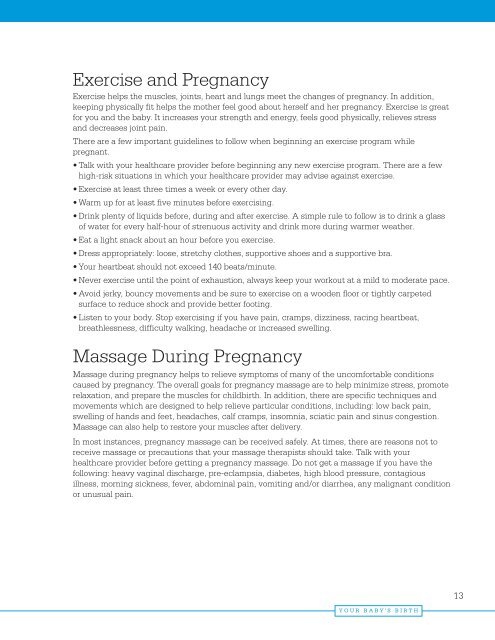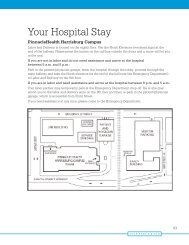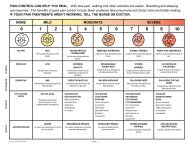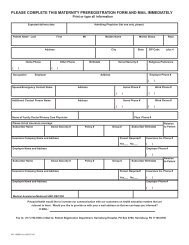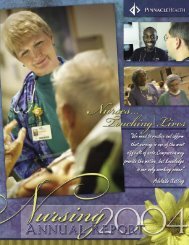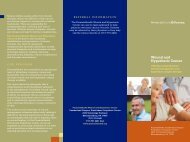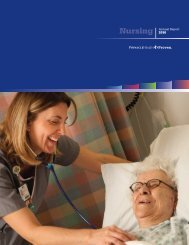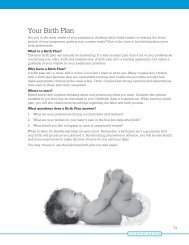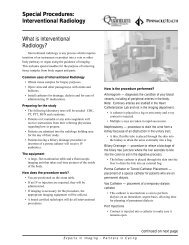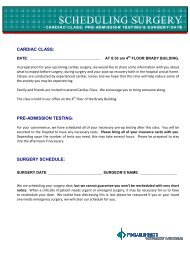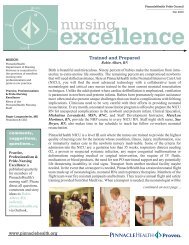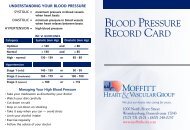Your Baby's Birth - Pregnancy & Childbirth Home
Your Baby's Birth - Pregnancy & Childbirth Home
Your Baby's Birth - Pregnancy & Childbirth Home
Create successful ePaper yourself
Turn your PDF publications into a flip-book with our unique Google optimized e-Paper software.
Exercise and <strong>Pregnancy</strong><br />
Exercise helps the muscles, joints, heart and lungs meet the changes of pregnancy. In addition,<br />
keeping physically fit helps the mother feel good about herself and her pregnancy. Exercise is great<br />
for you and the baby. It increases your strength and energy, feels good physically, relieves stress<br />
and decreases joint pain.<br />
There are a few important guidelines to follow when beginning an exercise program while<br />
pregnant.<br />
• Talk with your healthcare provider before beginning any new exercise program. There are a few<br />
high-risk situations in which your healthcare provider may advise against exercise.<br />
• Exercise at least three times a week or every other day.<br />
• Warm up for at least five minutes before exercising.<br />
• Drink plenty of liquids before, during and after exercise. A simple rule to follow is to drink a glass<br />
of water for every half-hour of strenuous activity and drink more during warmer weather.<br />
• Eat a light snack about an hour before you exercise.<br />
• Dress appropriately: loose, stretchy clothes, supportive shoes and a supportive bra.<br />
• <strong>Your</strong> heartbeat should not exceed 140 beats/minute.<br />
• Never exercise until the point of exhaustion, always keep your workout at a mild to moderate pace.<br />
• Avoid jerky, bouncy movements and be sure to exercise on a wooden floor or tightly carpeted<br />
surface to reduce shock and provide better footing.<br />
• Listen to your body. Stop exercising if you have pain, cramps, dizziness, racing heartbeat,<br />
breathlessness, difficulty walking, headache or increased swelling.<br />
Massage During <strong>Pregnancy</strong><br />
Massage during pregnancy helps to relieve symptoms of many of the uncomfortable conditions<br />
caused by pregnancy. The overall goals for pregnancy massage are to help minimize stress, promote<br />
relaxation, and prepare the muscles for childbirth. In addition, there are specific techniques and<br />
movements which are designed to help relieve particular conditions, including: low back pain,<br />
swelling of hands and feet, headaches, calf cramps, insomnia, sciatic pain and sinus congestion.<br />
Massage can also help to restore your muscles after delivery.<br />
In most instances, pregnancy massage can be received safely. At times, there are reasons not to<br />
receive massage or precautions that your massage therapists should take. Talk with your<br />
healthcare provider before getting a pregnancy massage. Do not get a massage if you have the<br />
following: heavy vaginal discharge, pre-eclampsia, diabetes, high blood pressure, contagious<br />
illness, morning sickness, fever, abdominal pain, vomiting and/or diarrhea, any malignant condition<br />
or unusual pain.<br />
13<br />
Y O U R B A B Y ’ S B I R T H


